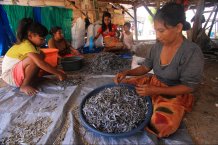Articles

The project will help build long-term research capability for marine planning and, in doing so, will support local coastal communities.
Supporting coastal communities in Southeast Asia
A group of UK researchers have been awarded funding from the Research Councils UK’s £225 million Global Challenges Research Fund (GCRF) to help support coastal communities in East and South East (E/SE) Asia that depend on healthy and diverse marine ecosystems for food, livelihoods, their health and well-being.
The Blue Communities project, led by Plymouth Marine Laboratory in collaboration with the University of Plymouth, the University of Exeter, international partners, UK non-governmental organizations (NGOs) and local stakeholders (please see notes for full partner list), will help build long-term research capability for marine planning over the next 4 years in E/SE Asia and, in doing so, support local coastal communities.
Millions of people across the globe rely on marine and coastal ecosystems for food, employment and their general well-being. However, the marine environment is under immense pressure from the multiple, and often conflicting, needs of the people that use it. In E/SE Asia, where marine activities are important contributors of Gross Domestic Product (GDP), marine spatial planning involving coordinated decision-making has been highlighted as a key requirement for a sustainable future.
Through academic-stakeholder collaborations and community co-creation, Blue Communities will support the development, implementation and ongoing management of initiatives that promote the sustainable use of marine resources. One of the most important aspects of this project is effective and culturally-sensitive relationship building with the wide-ranging stakeholders to engender trust between all parties and to underpin up-take of the marine management strategies developed over the course of the project.
The Blue Communities team will focus their work on case study areas in Indonesia, the Philippines, Vietnam, China and Malaysia. These identified areas are already designated as ‘UNESCO Man and the Biosphere Reserves’ or marine parks and there will be strong links forged between them and the North Devon Biosphere Reserve. These ‘science for sustainability’ support sites provide an established, collaborative infrastructure in which initiatives can be developed and tested alongside the local stakeholders, with an aim to then promote and trial with surrounding communities.
Professor Mel Austen, Blue Communities Principal Investigator and a Head of Science at Plymouth Marine Laboratory, comments: ‘We are excited to have been awarded the GCRF funding and we look forward to working and sharing knowledge with our South East Asian partners. We aim to compare the unique features, existing management strategies and local challenges for each of the case study sites, and then identify successful initiatives and best-practice that may also be beneficial in other areas.’
Professor Hoang Tri, chair of Vietnam’s National Committee for Man and Biosphere Program and Director of Center for Environmental Research and Education at the Hanoi National University of Education, noted: ‘This fund will be valuable to do research and study for global and national priorities for sustainability science, in both methodological development and good practices.’
Dr Jito Sugardjito, Blue Communities partner and Director of the Centre for Sustainable Energy and Resources Management (CSERM) at Universitas Nasional in Indonesia, remarked: ‘As a maritime nation, the action research to be conducted in our area will produce a great net benefit to the country's effort in mitigating climate change and establishing community resilience towards natural and social challenges through sustainable livelihood and resources management. It will also become a springboard for continuous capacity building and knowledge exchange between researchers and practitioners in Indonesia and the United Kingdom.’
Professor Goh, Hong Ching, Blue Communities partner and senior lecturer at the University of Malaya, continued: ‘We look forward to a productive collaboration and effective knowledge sharing with our UK and regional counterparts. Heartfelt thanks to RCUK for granting our proposal, and to our UK research partners for initiating and leading this project.’
Professor Lora Fleming, Co-Investigator of Blue Communities and Director of the European Centre for Environment & Human Health at the University of Exeter Medical School, stated: ‘The scientific and policy communities are really starting to appreciate how important the health of our seas and oceans are for human health and wellbeing in terms of both risks and opportunities. This is a new and exciting opportunity for us to work closely with partners in South East Asia to explore these issues in a region where so many people’s health is connected to marine ecosystems.’
Dr Sabine Pahl, Co-Investigator of Blue Communities and scientist at the University of Plymouth, concluded: ‘The human dimension is crucial in marine planning, in terms of decisions, perceptions and behaviours that affect the health of ecosystems and the people attached to them. Blue Communities will include behavioural science theory and methods to develop powerful communication and engagement methods and outputs.’
Date: 21 July 2017
